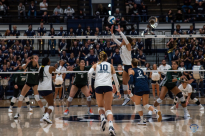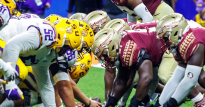Fears of confusion about Voter ID law don’t materialize
By Julia Kern and Jessica Illuzzi
On the heels of the halting this fall of Pennsylvania’s Voter ID law, which would have required voters to present IDs with valid expiration dates on Election Day, many political experts anticipated confusion yesterday.
On the contrary, the majority of problems on Election Day, at least in Centre County, seemed to stem not from Voter ID issues, but from voter confusion about their polling places, as well as frustration with occasional long lines, poll workers said.
At the HUB-Robeson Center, Alecia Panuski, a sophomore political science major and intern with Democrat-affiliated group Organize for America, said she fielded very few questions about Voter IDs.
“Of all the students we’ve had come through here, the biggest problem seems to be people not knowing where they’re supposed to vote,” Panuski said.
Marty Heckman, a junior information, science, and technology major and member of the Penn State College Republicans, was also helping at the HUB polling center. Like Panuski, he said he received no Voter ID-related questions.
“People are confused about where their polling places are, as well as who to vote for -- not so much about what IDs they need,” Heckman said.
Similarly, at the Unity Church of Jesus Christ at 140 N. Gill St., poll watcher Judy Vicary-Swisher said that she saw little to no confusion regarding Voter ID laws.
“People were pretty familiar with what they needed or didn’t need to vote, and also aware that next time around, the laws will be different,” Vicary-Swisher said. “The major sources of problems were either voters going to the incorrect polling place, or just getting frustrated with long lines where there were dense concentrations of voters.”
The Pennsylvania Voter ID law, approved by the Republican legislature and signed by Republican Gov. Tom Corbett, produced a storm of controversy. Democrats said they viewed the plan as a way to suppress voting among the poor and elderly – and college students – groups that might not have access to photo identification cards with expiration dates.
Republican insisted the law was designed to eliminate voting fraud.
Ultimately, the courts ruled that the Voter ID law could not be implemented for this election. In the past few weeks, Democrats, especially, were concerned that voters might be confused by the on-again, off-again changes.
Mary Dupois, a poll attendant at the Oakwood Presbyterian Church at 1901 Waddle Road, said she did have a few issues regarding Voter IDs, but that these issues occurred among older voters, not with students.
Dupois said the questions mostly involved adults not knowing what they needed or didn’t need, but that those questions were easily resolved.
One problem to which age did not seem to matter was the problem of long lines at various polling places.
At the Oakwood Presbyterian Church, Dupois said lines were particularly long in the morning. Despite the waits, peoples’ spirits remained high, she said.
“It’s amazing,” Dupois said. “People have been very patient considering the cold and the wait.”
Deborah Shaffer, a mother and Republican passing out flyers at the Oakwood Presbyterian Church, noted the long lines as well.
“People were very patient to stand in the long lines,” Shaffer said. “There was an hour and a half wait at some points in time.”
Voters like Ezgi Simsek, a junior physics major who voted at the Centre County Senior Center at 1:30 p.m., were not deterred.
“It seems like the line is moving,” Simsek said, while standing in line. “Even if it wasn’t, I would still come to vote.”
Throughout the day, the sky remained clear and temperatures hovered around 40 degrees. While the cold was not as big of a concern when the sun was shining, when the mercury dropped, voting places adjusted.
At the Friends Meeting House at 611 E. Prospect Ave., the line during the day at times went far out the door – such that some voters waited outside on the sidewalk for more than 40 minutes.
But around 4:45 p.m., with the dropping temperature, Andrew Jackson, judge of elections for 30th precinct, moved people inside the church, where they stood around the pews as they waited to cast their votes.







